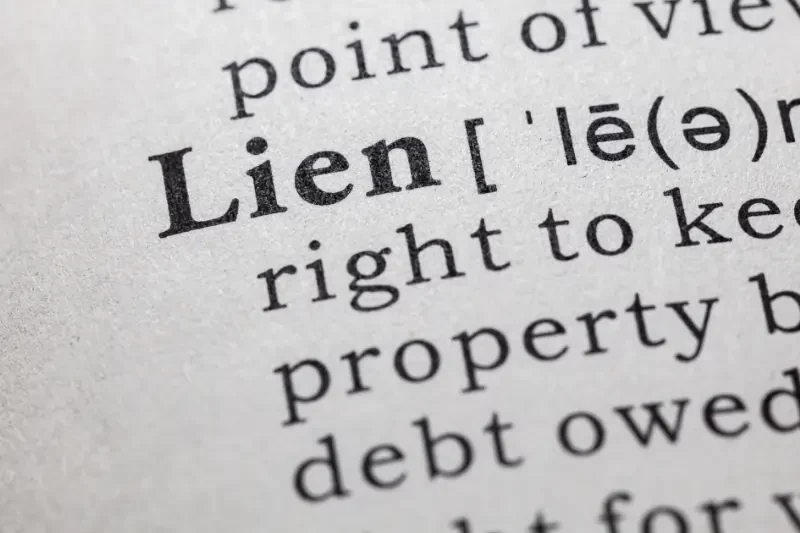
Are you wondering if your house can be sold with a lien? If you need to sell your house fast in Columbus but have discovered a lien on your property, you’re not alone. Many homeowners face this challenging situation when they decide to sell. The good news is that yes, a house with a lien can be sold, but there are important steps and considerations you need to be aware of before proceeding.
Understanding Property Liens
Definition of a Lien and Its Impact on Property Ownership
A property lien is a legal claim against your property that serves as security for a debt you owe. When someone places a lien on your home, it means you cannot sell the property with a clear title until the debt is paid and the lien is removed. Think of a lien as a “hold” on your property that gives the lien holder some rights to your property until you settle what you owe.
The impact of liens can be significant. They can make it difficult to sell your house, refinance your mortgage, or obtain new loans using your property as collateral. Most traditional buyers will be hesitant to purchase a house with a lien because the debt becomes their responsibility after the sale.
Types of Property Liens and Their Impacts
There are several types of liens that might be on your property:
- Mortgage lien – This is the most common type of lien. When you take out a mortgage to buy a home, the bank or mortgage lender places a lien on your property to secure the loan. These collateralized debt arrangements give mortgage lenders the right to foreclose if you stop making mortgage payments.
- Tax lien – When you don’t pay property or income taxes, government agencies can place a tax lien on your home. Government tax liens take priority over most other liens and can lead to serious consequences. The government may eventually force a foreclosure auction if unpaid taxes remain.
- Judgment lien – If someone sues you for unpaid debts and wins, the court may award them a judgment lien against your property. This general judgment lien ensures that the debt will be paid when you sell your home and represents their legal claim to receive money from your property’s sale proceeds.
- Mechanic’s lien (also known as a contractor’s lien) – If you hire someone to work on your home but don’t pay them, they can file a mechanic’s lien against your property. This lien protects contractors and suppliers who provide labor or materials for your property improvements but don’t get paid.
- HOA lien – If you belong to a homeowners’ association or condominium association and fail to pay your dues, the association can place a lien on your property for unpaid dues. Many associations have the power to foreclose for significant unpaid dues, making these liens particularly troublesome.
Each type of lien has different rules regarding how long it stays on your property and how it can be removed. Understanding which type of lien affects your property is the first step in determining how to address it.
How Liens are Created and Their Legal Implications
Liens are created in different ways depending on the type:
- Voluntary liens (like mortgages) happen when you agree to them as part of a loan agreement
- Involuntary liens (like tax liens or judgment liens) are placed on your property without your permission when you fail to meet a financial obligation
All liens must be properly recorded with the county recorder or similar government office to be valid. The legal implications of having a lien on your property include:
- Restricted ability to sell or refinance
- Potential for foreclosure if the debt remains unpaid
- Damage to your credit score
- Legal action from the lien holder
Can a house be sold with a lien on it? While legally possible, the lien must typically be addressed before or during the closing process.
Selling a House With a Lien
Overview of the Challenges and Complexities of Selling a House With a Lien
Selling a house with a lien presents several challenges:
- Limited buyer pool – Most traditional buyers using mortgage financing will be unwilling to purchase a property with liens.
- Title issues – You cannot provide a clear title to the buyer until all liens are resolved.
- Negotiation complications – The sale process becomes more complex when liens must be paid from the sale proceeds.
- Extended timelines – Resolving liens can significantly extend how long a house closing takes.
- Financial strain – If the liens exceed your home’s equity, you may need to bring money to the closing table.
Despite these challenges, can a house be sold with a lien? Yes, but it typically requires satisfying the lien before or during the sale.
Importance of Disclosing the Lien to Potential Buyers
Transparency is crucial when selling a property with liens. You must disclose all known liens to potential buyers. Failing to disclose liens can:
- Lead to legal action against you after the sale
- Cause the sale fell through during the title search
- Damage your reputation and credibility
- Result in financial penalties
Being upfront about liens allows buyers to make informed decisions and helps prevent last-minute surprises that could derail your sale.
Removing a Lien to Sell Your Home
Disputing or Negotiating the Lien with the Creditor or Lienholder
If you believe a lien is incorrect or the amount is wrong, you can dispute it. Here’s how:
- Gather documentation proving the lien is incorrect
- Contact the lien holder directly to discuss the situation
- Present your evidence and request a lien release
- Get any agreements in writing
Even if the lien is valid, you may be able to negotiate with the lien holder. Many creditors will accept a reduced payment to remove the lien, especially if the debt is old or if you’re facing financial hardship. Cash home buyers in Auburn, AL, purchase houses with liens directly, eliminating your need to handle these complex negotiations yourself.

Paying the Lien and Clearing the Title
The most straightforward way to remove a lien is to pay it in full:
- Contact the lien holder to get a current payoff amount
- Make the payment and request written confirmation
- Ensure the lien holder files a lien discharge with the proper government office
- Verify the lien has been removed by checking property records
If you don’t have the funds to pay the lien upfront, you might:
- Use proceeds from your home sale (if your equity exceeds the lien amount)
- Take out a home equity loan to pay the lien
- Set up a payment plan with the lien holder
Reviewing Options for Selling Your Home, Including Cash Offers
When dealing with liens, you have several selling options:
- Traditional sale: Pay off all liens before listing your property, or use the sale proceeds to clear the liens at closing. This works when you have enough equity to cover the liens.
- Short sale: If your liens exceed your home’s value, you might negotiate with lien holders to accept less than the full amount owed.
- Cash buyers: Companies that specialize in buying difficult properties often purchase homes with liens. We buy houses in Fort Mitchell and other areas regardless of lien status, and we can often close quickly despite these complications.
For homeowners with liens, working with a cash buyer can simplify the process significantly. These buyers typically have experience dealing with lien situations and can sometimes help negotiate with lien holders.
Do Liens Expire?
Understanding the Statute of Limitations for Different Types of Liens
Do liens expire? Yes, many types of liens have a statute of limitations:
- Judgment liens typically last between 5-20 years, depending on your state
- Mechanic’s liens usually expire after 1-2 years if no action is taken
- Tax liens can last 10 years or more and are often renewable
- Mortgage liens generally remain until the mortgage is paid in full
- HOA liens vary by state law and association bylaws
However, just because a lien has reached its expiration date doesn’t mean it automatically disappears from your property records. You may need to take action to have an expired lien officially removed.
Factors that Can Affect the Expiration of a Lien
Several factors can impact whether liens expire:
- Renewal actions – Many lien holders can renew liens before they expire, extending the time
- Bankruptcy filings – This can affect lien expiration timeframes
- State laws – Each state has different rules regarding lien expiration
- Type of debt – Some debts, like certain tax obligations, may never expire
- Legal actions – If the lien holder takes steps to enforce the lien, it may extend the timeline
Before assuming a lien has expired, consult with an experienced real estate attorney to verify its status.
Financial and Legal Implications of Liens
Liens have significant financial and legal consequences for property owners:
Financial impacts:
- Reduced property value
- Limited access to home equity
- Potential for additional interest and penalties
- Legal fees to resolve the situation
- Negative effect on credit scores
Legal consequences:
- Possible foreclosure proceedings
- Court judgments enforcing the lien
- Legal action from buyers if liens aren’t disclosed
- Inability to refinance or obtain new financing
Can a house be sold with a lien on it? While possible, these financial and legal complications make it challenging without professional assistance. Understanding how long escrow is can help you plan for the extended timeframe often needed when selling with liens.

Home Sale and Closing Process
Importance of Resolving Any Outstanding Liens Before Closing
When selling a house with liens, it’s crucial to address them before the closing process begins:
- Conduct a preliminary title search to identify all liens
- Contact each lien holder to determine payoff amounts
- Develop a plan for paying or disputing each lien
- Work with your title company to ensure all liens are properly handled
- Monitor the progress of lien removals
Most buyers will not close on a property until all liens are resolved or there’s a clear plan to pay them from the sale proceeds. The title company or escrow agent handling your closing will typically require lien payoffs before transferring the property.
Preventing Liens on Your Property
Strategies for Avoiding Liens, Including Timely Payment of Debts and Taxes
The best way to deal with liens is to prevent them from happening:
- Pay property taxes on time – Set up automatic payments or reminders
- Keep up with mortgage payments – Contact your lender immediately if you’re struggling
- Pay contractors promptly – Get lien waivers from contractors after payment
- Maintain HOA payments – Even if you disagree with fees, pay them while you dispute
- Address court judgments – Don’t ignore legal proceedings against you
- Keep good records – Maintain proof of payment for all property-related expenses
Taking these proactive steps can help you avoid the complications of having a lien placed on your property.
Importance of Monitoring Credit Reports and Property Records
Regular monitoring helps you catch potential lien issues early:
- Check your credit reports annually for judgment information
- Review property records periodically for unexpected liens
- Open and respond to all notices about your property
- Address any billing disputes promptly
If you discover a lien has been placed incorrectly, take immediate action to have it removed. The longer a lien remains, the more complicated it can become to resolve.
Working with a Cash Buyer
Benefits and Drawbacks of Selling to a Cash Buyer
For homeowners with liens, selling to a cash buyer offers several advantages:
Benefits:
- Cash buyers often purchase properties “as-is,” including those with liens
- Faster closing timeline, which can be important when facing financial pressure
- No need for bank financing approval, which liens would typically prevent
- Experienced in navigating complicated title situations
- It can sometimes help negotiate with lien holders
Potential drawbacks:
- Offers may be lower than the market value
- Less regulation than traditional real estate transactions
- Varying levels of experience among cash buying companies
How our home buying process works at Assured Property Solutions is specifically designed to help homeowners with complicated situations like property liens. We handle many of the complex aspects of the transaction, making it easier for you to move forward.

Navigating the Home Sale Process
Tips for Navigating the Home Sale Process With a Lien
If you’re selling a property with a lien, these steps can help:
- Start early – Begin addressing liens as soon as you decide to sell
- Be transparent – Disclose liens to potential buyers upfront
- Get professional help – Work with experts who understand lien resolution
- Prioritize which liens to address first – Some liens have more serious consequences than others
- Keep detailed records – Document all communications regarding the liens
- Consider alternative sale methods – Traditional sales may be more difficult with liens
Selling a distressed property with liens requires patience and persistence. The process may take longer than a standard sale, but with the right approach, it can be successful.
The Right Professional Help For Your Lien Situation
Professional guidance is invaluable when selling a house with liens, but you don’t need to pay expensive realtor commissions on top of your lien obligations:
A real estate attorney can provide essential services:
- Review the legal status of all liens
- Help dispute invalid liens
- Negotiate with lien holders
- Ensure proper documentation of lien releases
- Protect your legal interests throughout the sale
Instead of a traditional real estate agent who may have limited experience with lien complications and will charge you a commission, consider working directly with a cash home buying company that:
- Already understands the complexities of lien situations
- Has established relationships with title companies and lien holders
- Can handle the entire process from offer to closing
- Saves you thousands in realtor commissions
- Closes quickly without the delays of traditional buyers
For homeowners with liens, working with a specialized cash buying company provides the most straightforward, cost-effective outcome. Learn more about our company and how we help homeowners navigate these complex situations without the added stress and expense of traditional real estate transactions.
Conclusion
Can a house be sold with a lien on it? The answer is yes, but it requires understanding the types of liens, their implications, and the steps needed to address them. Whether you choose to pay off the liens before selling, negotiate with lien holders, or work with a cash buyer who can handle the complications, it’s important to approach the situation with knowledge and professional guidance.
Dealing with property liens can feel overwhelming, but you don’t have to navigate the process alone. Get a cash offer on your house today from a company that understands the complexities of selling a property with liens. With the right approach and assistance, you can resolve your lien issues and move forward with your home sale.
If you’re facing lien challenges and need to sell your property, contact us to discuss your specific situation and learn how we can help simplify the process for you.
